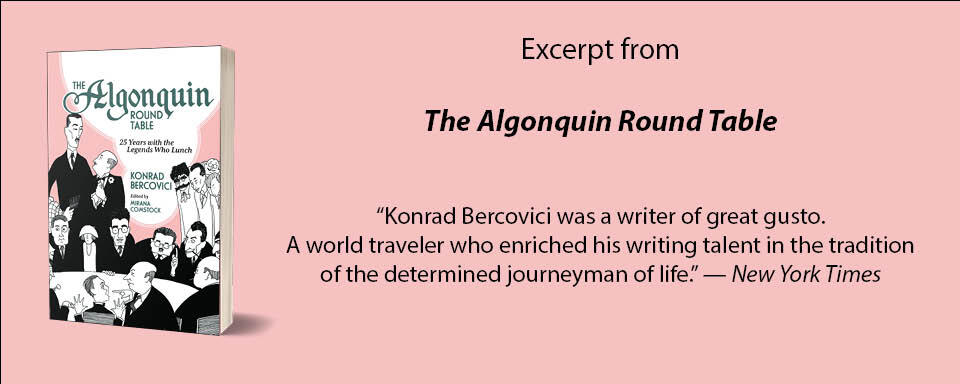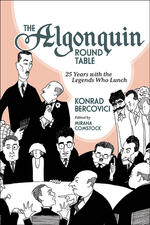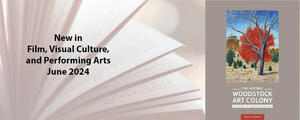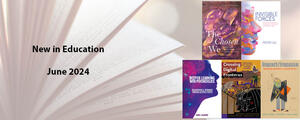
Excerpt: The Algonquin Round Table
The Algonquin Round Table: 25 Years with the Legends Who Lunch tells the facts and legends of New York's famed artistic hub told by one of its key participants.
Konrad Bercovici was a celebrated author and journalist and friend of many leading 20th century figures, including John Reed, Charlie Chaplin, Ernest Hemingway, and Paul Robeson.
Mirana Comstock is a screenwriter, poet, and musician who has recorded and performed in New York and the Boston area, where she now resides. She is currently adapting one of her grandfather's books as a miniseries.
"Konrad Bercovici was a writer of great gusto. A world traveler who enriched his writing talent in the tradition of the determined journeyman of life." — New York Times
"I have met a number of great men and Konrad was, of course, a great man, but never did I meet such a rare man. He was rare in the extraordinary accumulation of knowledge in so many variegated fields of life that it stunned the imagination to contemplate it. We all sat at his feet to learn and marvel … If I have to count the blessings of my life, high upon the list, if not indeed first, would be the privilege of being with him for perhaps a quarter of a century at daily luncheons." — Louis Nizer, author of My Life in Court
"…[Bercovici] wrote on sociological questions from the vantage of an educated man, an immigrant to one of the most complex and multicolored cities on earth—New York. The completeness with which he assimilated the flavors, forces and antecedents of his new suroundings testifies to his large capacity for social feeling." — Time Magazine
The following is an excerpt from The Algonquin Round Table
There was a Round Table in the Rose Room of the Algonquin Hotel. Many of the men and women who had lunched daily about that table were already nationally famous in all the branches of literature, or eventually became so.
In the course of twenty-five years that the table had been their daily gathering place, some of the ones who had lent great éclat had died, including Alexander Woollcott, Heywood Broun, Robert Benchley, Hendrik Willem van Loon, John Touhey, Ring Lardner, and Beatrice Kaufman. The others—Marc Connelly, Robert Sherwood, Deems Taylor, Dorothy Parker, Laurence Stallings, and Gene Fowler—eventually went west in search of greener pastures, and Franklin P. Adams, the beloved F. P. A., Edna Ferber, George Kaufman, and Harold Ross are probably finding reunion at the same table too replete with memories to gather about it. When they do come, they come singly and sit at separate tables most of the time.
As a group, they represented what was most conspicuous in those days. They were able men and women in their respective fields, and were colorful. They were, in their own way, like the group in Paris known as les grands tapageurs. Benchley’s hilarity, Broun’s pugnacious columns, Woollcott’s and Ward Moorehouse’s fearless criticism, Deems Taylor’s music, Sherwood’s, Kaufman’s, Connelly’s, and Ferber’s plays were new and startling in America. Beggar on Horseback, Butter and Egg Man, The Royal Family, Green Pastures, The Petrified Forest, The Man Who Came to Dinner, and Reunion in Vienna were startling innovations.
Ring Lardner’s originality, van Loon’s learning and quipping, and F. P. A.’s stabbing lines were way out of the ordinary and made people sit up and take notice. Dorothy Parker’s bon mots had wings. Within twenty-four hours they had flown from lip to lip, were embedded in type, quoted, and repeated, and became part of the folklore of the literati and cognoscenti—not without the help of Frank Case’s friends, the columnists. The columnists were originally small-town newspapermen who brought the “personals” to the big city. When Dorothy Parker hadn’t said anything witty in a long time, some clever fellow invented something that sounded as if she might have said it. It helped keep the reputation of the Algonquin Round Table’s smartness in good standing, active, and an attraction.
Many people lunched in the Rose Room to see the famous and perhaps hear what they said, as much as they came to eat. And since the Round Tablers themselves were young and splendid showmen, they enjoyed being seen and admired, despite their seeming detachment from the hoi polloi. They made entrances and exits at the Algonquin. They made people aware that they were somebodies. The waiters took their cue from Case and made a great fuss over them. There wasn’t a shrinking violet in the lot. Woollcott, Broun, Benchley, Connelly, and Kaufman, to name only a few, eventually acted on the stage and in the movies, in plays about themselves, or in their own plays.
During the life of the Rose Room Round Table, another group of people lunched daily together in the Oak Room. Frank Case used to refer to it as the “Soap Box.” The more perspicacious headwaiter, Raul, who used to and still does lend an attentive ear to the discussions at that table, calls it “The Academy.”
While literature in all its branches was the chief topic in the Rose Room—literature and the gossip about writers, editors, publishers, directors, and producers—around the Oak Room table, the discussions hovered between local, national, and international politics, economics and philosophy, law and the sciences, with literature and the other arts thrown in for good measure.
Since the dissolution of the Rose Room Round Table, many new things have come into being, with which they hadn’t had to concern themselves. World War II. Radar. Television. The atomic bomb. Nuclear physics. Literature, per se, has been somewhat relegated to the rear.
The constants at the Oak Room table are Lou Nizer, Dr. Frank Kingdon, Jack Alicoate, Martin Quigley, Harry Hershfield, William G. O’Brien, Elmer Leterman, and myself. Unlike what happened in the Rose Room, guests are not frowned upon, but they are generally of a caliber at least equal to the constants. When a guest like Dr. Hyman Goldsmith, the eminent nuclear physicist, is there, he is plied with questions about nuclear physics. When a diplomat like Clark Griffith lunches at that table, the questions asked are of national and international importance. Dr. Amadeo Gianini, the banker, is questioned on financial matters, psychiatrists on their subjects, and biologists on theirs. An array of men prominent in all walks of life, in every phase of culture—novelists, philosophers, priests, judges, ministers, rabbis, generals, mayors of cities, police chiefs, actors, producers, directors, newspaper columnists, and television technicians—succeed each other.
Lou Nizer, with his best courtroom technique, is always first to question the witness. Suave, he elicits answers to questions his witness is not prepared to answer.
“If I am not indiscreet, would you please tell us whether, in your opinion, the Russians are as well advanced in nuclear physics as they say they are?”
Or, to John Rogge, the prosecuting attorney in the case of the subversive group which was dropped by the authorities after the death of the judge:
“Why was the case dropped? Lack of evidence or a weak stomach?” And Rogge, embarrassed, answering that in the light of what he has since learned, the case should never have been tried.
And if a guest attempts to make others believe that he knows more than he really does, Frank Kingdon is right on top of him to prove him out of his own depth; for there is little that Frank hasn’t looked into with keen eyes and delved deeply with his splendidly equipped mind. He raises his sword with a laugh, like a gay warrior, and proceeds to puncture the other one’s armor full of holes. Frank’s motto is: “No Sham.”
Harry Hershfield has an apropos story on every subject. He can make the dictionary read like a joke book. What one hears him tell over the air are pale copies of strong originals.
Jack Alicoate holds the reins, is the moderator, and sees that no one monopolizes a discussion.
“Now, we’ve heard you. Let somebody else have a go at this man.” Jack is a pessimistic capitalist. He is an anti-communist, but is afraid that some form of communism is going to engulf us and the world, and only hopes it is held off while he is alive.
Elmo Roper, the pollster who so blithely predicted the defeat of President Truman, was made to give an account, not of his false prediction, but of the manner of getting the information on which his prediction was based.
“Are polls wind waves or wind tunnels?” Jack asked.
“Isn’t what is in the mind of the questioner guiding the answers?” Lou Nizer wanted to know. And a third one quoted: “Since polls have failed to predict the trend on such important events as national elections, by their present methods, are the pollsters going to change their methods?” “What about big business? What is their reaction to your wrong guesses?”
Martin Quigley, who knows more about theological history than a college professor, expounds his knowledge in slow, measured sentences that sound as if conceived in medieval Latin, though he uses the most colloquial English.
John G. O’Brien, who has spent many years in government service, abroad, is the European expert.
Radio companies have repeatedly offered to put those daily discussions on the air, but by general assent the offers were refused, chiefly because the table would be robbed of its spontaneity; because everybody would be self-conscious, and conscious that he was talking to millions of people, instead of a dozen or so. When appropriate, no one hesitates to use strong language. Television, too, has made its offer and been refused.
Bromides and bores are not invited a second time.
A list of the names of all the people who have participated in the discussions of the Oak Room Round Table would be like the roster of an encyclopedia. The men in the Oak Room are far from being of one opinion on any subject: literary, political, or economic. Strong personalities, they argue heatedly with whoever differs with their views, but without acrimony. Twenty years of threshing out their opinions and beliefs with each other has not disturbed the personal harmony among people poles apart in opinions, and of different races, backgrounds, faiths, and cultures. It could only happen in the U.S.A.
I venture to say that in some future day, a distant future day, I hope, people will speak of the Oak Room Round Table with the same nostalgia they are now speaking of the Rose Room table.
“Where are the snows of yesteryear?”



